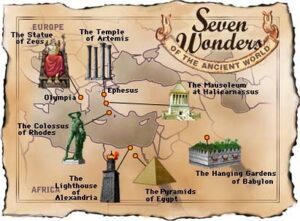“But this you have, that you hate the deeds of the Nicolaitans, which I also hate” (Revelation 2:6).
So who were the Nicolaitans and what were they doing to provoke this kind of reaction from Jesus? We can respond to that question by considering two general theories regarding the Nicolaitans.
One theory holds that the Nicolaitans were the followers of someone (presumably known as Nicolaus) who taught and encouraged others to engage in various types of immoral behaviors. In view of the Biblical admonitions regarding such conduct, it’s easy to see why Jesus would express His hatred concerning such teachings.
Another view is grounded in the meaning of the word “Nicolaitan.” In the original language of the book of Revelation, the word “Nicolaitan” is derived from two words: nikos (meaning to vanquish or conquer) and laos (meaning people). Thus, we can interpret the word “Nicolaitan” as a reference to those who seek to conquer or lord over people.
Because of this, some believe that the Nicolaitans comprised those who sought to exercise a God-like degree of authority over others. Again, it’s easy to see why Jesus would strongly oppose those who followed that practice. Either way, it doesn’t take a great deal of common sense to know that it’s a bad idea to support something Jesus hates.
Jesus then closed His letter with these words…
“He who has an ear, let him hear what the Spirit says to the churches. To him who overcomes I will give to eat from the tree of life, which is in the midst of the Paradise of God” (Revelation 2:7).
The “tree of life” referenced here first appeared in Genesis 2:9. “Eating from the tree of life” is a poetic way of referring to eternal life with God in a perfect environment; a paradise where we will enjoy a loving, honest and genuine relationship with God forever. As we’re told later in the book of Revelation, this is a place where “there shall be no more death, nor sorrow, nor crying. There shall be no more pain, for the former things have passed away” (Revelation 21:4).
Finally, we have this reference to “those who overcome.” In respect to this idea, its been said that there are three obstacles that every God-honoring person must subdue. The first obstacle is the everyday world that goes about it’s business as though God did not exist. The second obstacle is our human tendency to think and act in ways do not align with God’s intent for humanity. The third obstacle is represented by Satan, a powerful, unseen spiritual enemy.
Taken together, these obstacles are commonly known as the world, the flesh, and the devil. While overcoming these obstacles may be difficult, a great reward awaits those who do so though the ability that God provides.


 In our text from the Gospel of Mark, Jesus informs us that humanity’s primary job description involves the responsibility to love God with all our heart, soul, mind, and strength. Thus, our highest-ranking love should be expressed toward God. Unfortunately, it seems as if the Christians in Ephesus were so busy doing good things that they forgot the most important thing: to love God first and foremost.
In our text from the Gospel of Mark, Jesus informs us that humanity’s primary job description involves the responsibility to love God with all our heart, soul, mind, and strength. Thus, our highest-ranking love should be expressed toward God. Unfortunately, it seems as if the Christians in Ephesus were so busy doing good things that they forgot the most important thing: to love God first and foremost. Judging from this portion of Jesus’ letter, we may conclude that the church at Ephesus featured a group of individuals who refused to give up, even during times of hardship. If the Christians at Ephesus “patiently suffered” for their belief in Christ, then it can only mean that they remained steadfast in their commitment to Him despite the trials, adversities, and difficulties they encountered. It also seems reasonable to assume that the members of the Ephesian church displayed unwavering determination and resilience in the face of various challenges. Finally, we can say that the Ephesian Christians exhibited faithfulness in dealing with stressful conditions.
Judging from this portion of Jesus’ letter, we may conclude that the church at Ephesus featured a group of individuals who refused to give up, even during times of hardship. If the Christians at Ephesus “patiently suffered” for their belief in Christ, then it can only mean that they remained steadfast in their commitment to Him despite the trials, adversities, and difficulties they encountered. It also seems reasonable to assume that the members of the Ephesian church displayed unwavering determination and resilience in the face of various challenges. Finally, we can say that the Ephesian Christians exhibited faithfulness in dealing with stressful conditions. Ephesus boasted a large theatre with a seating capacity of approximately 20-30,000 people that appears in
Ephesus boasted a large theatre with a seating capacity of approximately 20-30,000 people that appears in  Imagine if Jesus wrote a personal letter to your church. What would He say in that message? Would His message be complimentary, or would He emphasize the need for change and improvement? Well, the answers to those questions were not a matter of speculation for seven churches of the New Testament era. Instead, Jesus provided those answers in the form of a personalized message to each church.
Imagine if Jesus wrote a personal letter to your church. What would He say in that message? Would His message be complimentary, or would He emphasize the need for change and improvement? Well, the answers to those questions were not a matter of speculation for seven churches of the New Testament era. Instead, Jesus provided those answers in the form of a personalized message to each church. So Revelation 1:19 provides us with a reference to the past (“what you have seen“), the present (“what is“), and the future (“what will take place after this“), all within a single verse. That being said, how do we know when the future begins in the book of Revelation? How can we separate the present from the future within this book?
So Revelation 1:19 provides us with a reference to the past (“what you have seen“), the present (“what is“), and the future (“what will take place after this“), all within a single verse. That being said, how do we know when the future begins in the book of Revelation? How can we separate the present from the future within this book?